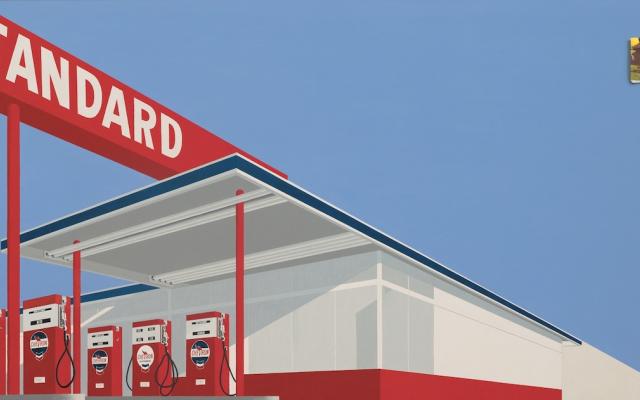Forking Sprawl
1971 - Drawing & Print (Drawing & Print)
Robert Smithson
Artist Robert Smithson is best known as a major proponent of Land Art, visiting quarries, industrial sites, and abandoned wastelands in New Jersey and its surrounding states throughout the late 1960s. He would go on to work in the deserts of the Southwest, with his seminal Spiral Jetty , a land sculpture made of mud, salt crystals, and basalt rocks, produced on the northern shore of Utah’s Great Salt Lake. While his early work largely consisted of paintings and drawings, he later began to produce Minimalist sculpture before producing more monumental work, moving earth and land in order to create interventions that would alter the landscape. Alongside his visual practice, Smithson wrote a number of theoretical texts outlining the influence of temporal considerations and the relationship between a work of art and the surrounding environment to his work.
Colors:

© » LARRY'S LIST
Ed Ruscha
The fashion designer is selling off all the art inside his West Village townhouse at Sotheby’s New York to make way for a new collection....

© » KADIST
Raymond Pettibon
2005The five works included in the Kadist Collection are representative of Pettibon’s complex drawings which are much more narrative than comics or cartoon...

© » KADIST
Stephen G. Rhodes
2010For his series of digital collages Excerpt (Sealed)… Rhodes appropriated multiple images from mass media and then sprayed an X on top of their glass and frame...

© » KADIST
Julian Hoeber
2011Every work in Hoeber’s 2011 series Execution Changes is titled in alphanumeric code...

© » KADIST
Raymond Pettibon
The five drawings included in the 101 Collection are representative of Pettibon’s characteristic cartoonish style...

© » KADIST
Wong Wai Yin
2021Drawn from the widely circulated images of protests around the world in support of women rights and racial equality, the phrase I can’t believe we are still protesting is both the title of Wong Wai Yin’s photographic series and a reference to similar messages seen on protest signages...

© » KADIST
Carlos Amorales
2007This work, a large oil painting on canvas, shows a moment from Amorales’s eight-minute two-channel video projection Useless Wonder (2006)...

© » KADIST
Carlos Amorales
2006This work, a large oil painting on canvas, shows a moment from Amorales’s eight-minute two-channel video projection Useless Wonder (2006)...

© » KADIST
Rivane Neuenschwander
2007Mapa-Mundi BR (postal) is a set of wooden shelves holding postcards that depict locations in Brazil named for foreign countries and cities...

© » ART & OBJECT
Ed Ruscha
Ed Ruscha's Poetry of the American Experience | Art & Object Skip to main content Subscribe to our free e-letter! Webform Your Email Address Role Art Collector/Enthusiast Artist Art World Professional Academic Country USA Afghanistan Albania Algeria American Samoa Andorra Angola Anguilla Antarctica Antigua & Barbuda Argentina Armenia Aruba Ascension Island Australia Austria Azerbaijan Bahamas Bahrain Bangladesh Barbados Belarus Belgium Belize Benin Bermuda Bhutan Bolivia Bosnia & Herzegovina Botswana Bouvet Island Brazil British Indian Ocean Territory British Virgin Islands Brunei Bulgaria Burkina Faso Burundi Cambodia Cameroon Canada Canary Islands Cape Verde Caribbean Netherlands Cayman Islands Central African Republic Ceuta & Melilla Chad Chile China Christmas Island Clipperton Island Cocos (Keeling) Islands Colombia Comoros Congo - Brazzaville Congo - Kinshasa Cook Islands Costa Rica Croatia Cuba Curaçao Cyprus Czechia Côte d’Ivoire Denmark Diego Garcia Djibouti Dominica Dominican Republic Ecuador Egypt El Salvador Equatorial Guinea Eritrea Estonia Eswatini Ethiopia Falkland Islands Faroe Islands Fiji Finland France French Guiana French Polynesia French Southern Territories Gabon Gambia Georgia Germany Ghana Gibraltar Greece Greenland Grenada Guadeloupe Guam Guatemala Guernsey Guinea Guinea-Bissau Guyana Haiti Heard & McDonald Islands Honduras Hong Kong SAR China Hungary Iceland India Indonesia Iran Iraq Ireland Isle of Man Israel Italy Jamaica Japan Jersey Jordan Kazakhstan Kenya Kiribati Kosovo Kuwait Kyrgyzstan Laos Latvia Lebanon Lesotho Liberia Libya Liechtenstein Lithuania Luxembourg Macao SAR China Madagascar Malawi Malaysia Maldives Mali Malta Marshall Islands Martinique Mauritania Mauritius Mayotte Mexico Micronesia Moldova Monaco Mongolia Montenegro Montserrat Morocco Mozambique Myanmar (Burma) Namibia Nauru Nepal Netherlands Netherlands Antilles New Caledonia New Zealand Nicaragua Niger Nigeria Niue Norfolk Island Northern Mariana Islands North Korea North Macedonia Norway Oman Outlying Oceania Pakistan Palau Palestinian Territories Panama Papua New Guinea Paraguay Peru Philippines Pitcairn Islands Poland Portugal Puerto Rico Qatar Romania Russia Rwanda Réunion Samoa San Marino Saudi Arabia Senegal Serbia Seychelles Sierra Leone Singapore Sint Maarten Slovakia Slovenia Solomon Islands Somalia South Africa South Georgia & South Sandwich Islands South Korea South Sudan Spain Sri Lanka St...

© » KADIST
Raymond Pettibon
2007The five works included in the Kadist Collection are representative of Pettibon’s complex drawings which are much more narrative than comics or cartoon...

© » KADIST
Haegue Yang
2010In addition to Yang’s signature drying rack and light bulbs, Office Voodoo includes various office supplies like CDs, paper clips, headphones, a computer mouse, a stamp, a hole puncher, a mobile phone charger...

© » KADIST
Daniel Joseph Martinez
1978For I use to eat lemon meringue pie till I overloaded on my pancreas with sugar and passed out; It seemed to be a natural response to a society of abundance (1978), also known as the Bodybuilder series, Martinez asked male bodybuilding competitors to pose in whatever position felt “most natural.” They are obviously trained in presenting their ambitiously carved physiques, but their facial expressions seem comparatively unstudied...

© » KADIST
Tony Oursler
2012Continuing Oursler’s broader exploration of the moving image, Absentia is one of three micro-scale installations that incorporate small objects and tiny video projections within a miniature active proscenium...






